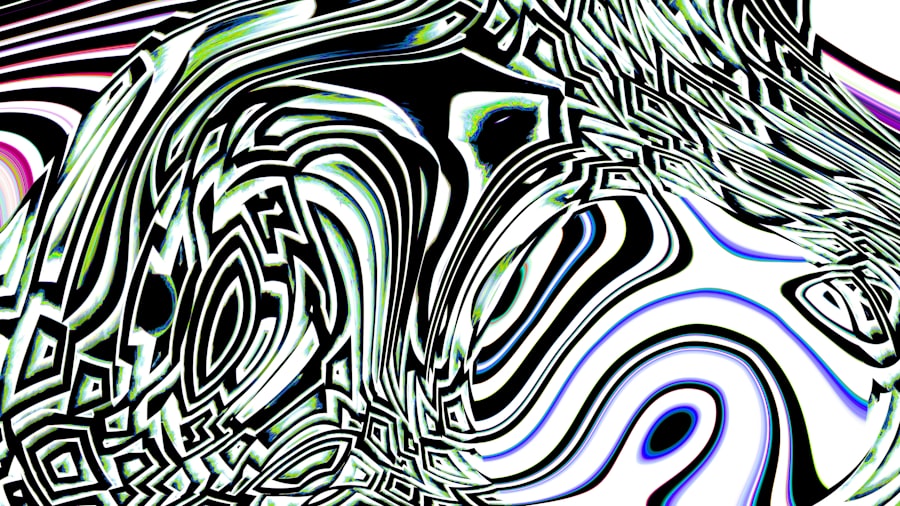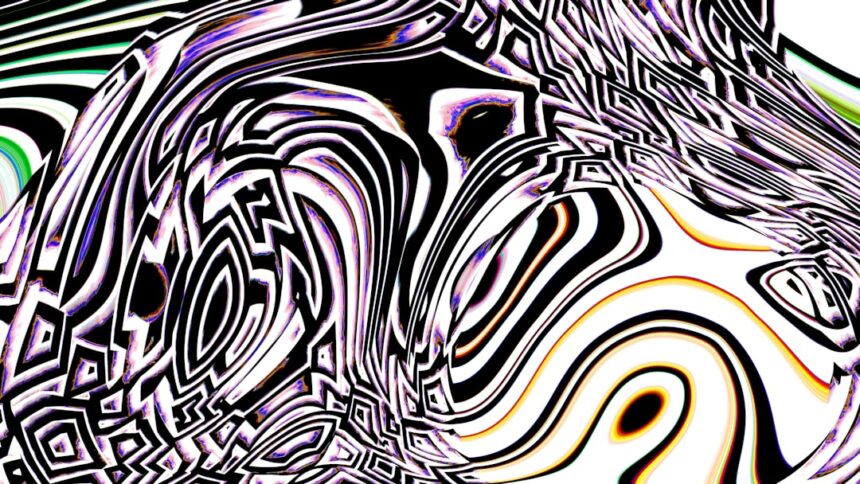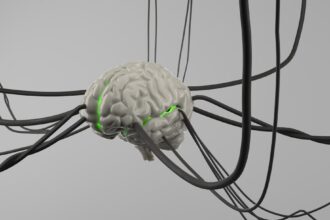Depersonalization and derealization are psychological phenomena that can significantly affect an individual’s perception of themselves and their surroundings. When you experience depersonalization, you may feel detached from your own thoughts, feelings, or sense of self. It’s as if you are observing yourself from outside your body, leading to a sense of unreality regarding your identity.
This can be disconcerting, as you might feel like a stranger in your own life, unable to connect with your emotions or experiences fully. On the other hand, derealization involves a sense of detachment from the external world. You may perceive your environment as dreamlike or distorted, where familiar places and people seem strange or unreal.
This can create a profound sense of isolation, as the world around you feels unrecognizable. Both depersonalization and derealization can occur independently or together, often triggered by stress, trauma, or mental health conditions such as schizophrenia. Understanding these experiences is crucial for those who face them, as they can be distressing and disorienting.
Key Takeaways
- Depersonalization and derealization are experiences of feeling detached from oneself and the surrounding environment, respectively.
- Symptoms of depersonalization and derealization in schizophrenia may include feeling like a robot or an observer in one’s own body, and experiencing the world as unreal or distorted.
- Causes of depersonalization and derealization in schizophrenia may be related to alterations in brain function and neurotransmitter imbalances.
- Depersonalization and derealization can significantly impact daily life for individuals with schizophrenia, leading to difficulties in social interactions and functioning.
- Diagnosing depersonalization and derealization in schizophrenia involves a thorough assessment of symptoms and ruling out other potential causes.
Symptoms of Depersonalization and Derealization in Schizophrenia
Individuals with schizophrenia may experience symptoms of depersonalization and derealization that can complicate their overall condition. You might find yourself feeling disconnected from your thoughts or emotions, leading to a sense of confusion about who you are. This disconnection can manifest as a lack of emotional response to situations that would typically elicit strong feelings, making it challenging to engage with others or even yourself.
Additionally, derealization can lead to a distorted perception of reality. You may feel as though the world around you is foggy or unreal, which can exacerbate feelings of paranoia or anxiety that often accompany schizophrenia. These symptoms can create a vicious cycle; the more you struggle with feelings of unreality, the more isolated and anxious you may become.
Recognizing these symptoms is essential for understanding how they fit into the broader context of schizophrenia and for seeking appropriate help.
Causes of Depersonalization and Derealization in Schizophrenia

The causes of depersonalization and derealization in individuals with schizophrenia are complex and multifaceted. One significant factor is the underlying neurobiological changes associated with schizophrenia itself. Abnormalities in brain structure and function can lead to altered perceptions of reality, contributing to feelings of detachment from oneself and the environment.
Neurotransmitter imbalances, particularly involving dopamine and serotonin, may also play a role in these experiences. Moreover, psychological factors such as trauma or extreme stress can trigger episodes of depersonalization and derealization. If you have experienced significant life events or ongoing stressors, these feelings may arise as a coping mechanism.
Your mind might create a buffer against overwhelming emotions by detaching from reality, leading to these dissociative experiences. Understanding these causes is vital for developing effective treatment strategies and addressing the root issues contributing to your symptoms.
How Depersonalization and Derealization Impact Daily Life for Individuals with Schizophrenia
| Impact | Description |
|---|---|
| Emotional Distress | Feelings of detachment can lead to increased anxiety and depression. |
| Social Isolation | Difficulty connecting with others due to feeling disconnected from reality. |
| Impaired Functioning | Struggle to complete daily tasks and maintain employment or relationships. |
| Reduced Quality of Life | Overall impact on well-being and ability to enjoy life. |
Living with depersonalization and derealization can profoundly impact your daily life, especially when intertwined with schizophrenia. You may find it challenging to perform routine tasks or engage in social interactions due to feelings of unreality. This detachment can lead to difficulties in maintaining relationships, as friends and family may struggle to understand what you are experiencing.
Additionally, these symptoms can interfere with your ability to work or pursue hobbies. You might feel disconnected from your interests or unable to concentrate on tasks that once brought you joy.
This disconnection can lead to a cycle of frustration and despair, further exacerbating your mental health challenges. Recognizing how these experiences affect your daily life is crucial for finding ways to cope and seek help.
Diagnosing Depersonalization and Derealization in Schizophrenia
Diagnosing depersonalization and derealization within the context of schizophrenia requires careful assessment by mental health professionals. You may undergo a comprehensive evaluation that includes interviews about your symptoms, medical history, and any previous mental health issues. It’s essential for clinicians to differentiate between these dissociative experiences and other symptoms of schizophrenia, such as hallucinations or delusions.
Standardized diagnostic tools may also be employed to assess the severity and frequency of your depersonalization and derealization symptoms. This thorough approach ensures that you receive an accurate diagnosis, which is critical for developing an effective treatment plan tailored to your needs. Understanding the nuances of your experiences will help clinicians provide the best possible care.
Treatment Options for Depersonalization and Derealization in Schizophrenia

Treatment options for managing depersonalization and derealization in individuals with schizophrenia often involve a combination of medication and psychotherapy. Antipsychotic medications are commonly prescribed to address the core symptoms of schizophrenia, which may also help alleviate dissociative experiences. These medications work by balancing neurotransmitters in the brain, potentially reducing feelings of detachment.
Psychotherapy can also play a vital role in treatment. Cognitive-behavioral therapy (CBT) is particularly effective in helping you understand and reframe your thoughts related to depersonalization and derealization. Through therapy, you can develop coping strategies to manage these symptoms more effectively while addressing the underlying issues related to schizophrenia.
Coping Strategies for Individuals with Schizophrenia Experiencing Depersonalization and Derealization
Coping with depersonalization and derealization while managing schizophrenia requires a multifaceted approach. One effective strategy is grounding techniques, which help anchor you in the present moment. Engaging in mindfulness practices, such as deep breathing exercises or focusing on sensory experiences (like feeling textures or listening to sounds), can help reduce feelings of detachment.
Establishing a routine can also provide structure and stability in your daily life. By creating a schedule that includes regular activities, social interactions, and self-care practices, you can foster a sense of normalcy amidst the chaos of your experiences. Additionally, journaling about your feelings can serve as an outlet for expression and reflection, allowing you to process your emotions more effectively.
The Role of Medications in Managing Depersonalization and Derealization in Schizophrenia
Medications play a crucial role in managing depersonalization and derealization symptoms within the context of schizophrenia. Antipsychotic medications are often the first line of treatment for schizophrenia itself; however, they can also have a positive impact on dissociative symptoms. By stabilizing mood and reducing psychotic episodes, these medications may help alleviate feelings of detachment.
In some cases, additional medications such as antidepressants or anti-anxiety medications may be prescribed to address specific symptoms related to anxiety or depression that often accompany depersonalization and derealization. It’s essential to work closely with your healthcare provider to find the right medication regimen that addresses both your schizophrenia symptoms and dissociative experiences effectively.
Understanding the Relationship Between Depersonalization, Derealization, and Psychosis in Schizophrenia
The relationship between depersonalization, derealization, and psychosis in schizophrenia is complex and multifaceted. Psychosis often involves a disconnection from reality characterized by hallucinations or delusions; however, depersonalization and derealization add another layer to this experience by creating feelings of detachment from oneself and one’s surroundings. You may find that these dissociative symptoms intensify during psychotic episodes or periods of heightened stress.
Understanding this relationship is crucial for developing effective treatment strategies. By addressing both psychotic symptoms and dissociative experiences simultaneously, mental health professionals can provide more comprehensive care tailored to your unique needs. Recognizing how these elements interact will empower you to seek appropriate support when needed.
The Importance of Support Systems for Individuals with Schizophrenia and Depersonalization/Derealization
Having a strong support system is vital for individuals navigating the challenges of schizophrenia alongside depersonalization and derealization. Friends, family members, and mental health professionals can provide essential emotional support during difficult times. When you feel isolated due to your experiences, having someone who understands what you’re going through can make all the difference.
Support groups specifically tailored for individuals with schizophrenia can also be beneficial. These groups offer a safe space where you can share your experiences with others who face similar challenges. Connecting with peers who understand your struggles fosters a sense of belonging and reduces feelings of isolation.
Building a robust support network is crucial for managing your mental health effectively.
Research and Future Directions for Understanding and Treating Depersonalization and Derealization in Schizophrenia
Research into depersonalization and derealization within the context of schizophrenia is ongoing, with scientists striving to understand these complex phenomena better. Future studies aim to explore the neurobiological underpinnings of these experiences further, potentially leading to more targeted treatment options that address both dissociative symptoms and psychotic features. Additionally, there is a growing interest in developing innovative therapeutic approaches that incorporate mindfulness practices alongside traditional treatments.
By integrating holistic methods into standard care protocols, mental health professionals may enhance their ability to support individuals experiencing depersonalization and derealization effectively. As research continues to evolve, there is hope for improved understanding and treatment options for those affected by these challenging experiences within the framework of schizophrenia.
In exploring the complex relationship between depersonalization, derealization, and schizophrenia, it’s essential to consider the nuanced perspectives offered by mental health professionals. An insightful article on this topic can be found on Unplugged Psych, which delves into the intricacies of these dissociative experiences and their impact on individuals with schizophrenia. The article provides a comprehensive overview of how these symptoms manifest and the challenges they pose in diagnosis and treatment. For a deeper understanding, you can read more about it on their website.
LEARN MORE About Unmasking the Mysteries Behind Depersonalization and Derealization
FAQs
What is depersonalization and derealization in schizophrenia?
Depersonalization and derealization are experiences where individuals feel detached from themselves or their surroundings. In schizophrenia, these symptoms can be particularly distressing and can contribute to a sense of disconnection from reality.
What are the symptoms of depersonalization and derealization in schizophrenia?
Symptoms of depersonalization may include feeling like an outside observer of one’s thoughts or body, feeling like one’s body or actions are not their own, or feeling disconnected from emotions. Derealization symptoms may include feeling like the world is unreal or distorted, feeling like one’s surroundings are unfamiliar or artificial, or feeling like time is distorted.
How are depersonalization and derealization in schizophrenia treated?
Treatment for depersonalization and derealization in schizophrenia may involve a combination of antipsychotic medications, psychotherapy, and support from mental health professionals. It is important for individuals experiencing these symptoms to seek help from a qualified healthcare provider.
What causes depersonalization and derealization in schizophrenia?
The exact cause of depersonalization and derealization in schizophrenia is not fully understood, but it is believed to be related to abnormalities in brain function and neurotransmitter imbalances. These symptoms can also be triggered or exacerbated by stress, trauma, or substance abuse.
Can depersonalization and derealization in schizophrenia be managed?
Yes, with proper treatment and support, individuals with schizophrenia can learn to manage their symptoms of depersonalization and derealization. It is important for individuals to work closely with mental health professionals to develop a comprehensive treatment plan.




